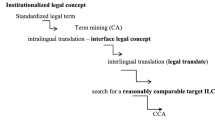Abstract
In comparison with the creation of language, translation from one language to another offers greater challenges for those working with languages, be the text for translation concerned with philosophy, literature or law, all of which are arguably highly professional domains. When it comes to the translation of legal fiction, a highly interdisciplinary genre, even experienced practicing translators tend to fall short of being well equipped with sufficient legal knowledge and terminologies, not to mention the capacity to detect the subtleties that are inherent in a legal term. All of the problems above account for the often less-than-satisfactory quality of legal fiction in translation, misleading or confusing the potential target audience. After making the prior theoretical investigations, this paper attempts to analyze some problems in the current Chinese translation of such legal novels as Franz Kafka’s Der Prozess and Charles Dickens’s Bleak House, and then take a corrective stance, hoping to arouse the translators’ awareness of the importance of this genre, as well as their awareness of the essential professional skills they still need to acquire, so that they can reach equivalent accuracy in legal technicalities, as well as subtlety and nuance that reflect the legal spirit.
Similar content being viewed by others
References
Dickens, Charles. 2009. Bleak House. Trans. S. Zhang, B. Zhang. Wuhan: Changjiang Literature and Art Publishing House.
Kafka, Franz. 2006. Der Prozess. Trans. M. Qian. Beijing: International Culture Publishing Group.
Posner, Richard. 2002. Law and literature. Trans. G. Li. Beijing: China University of Political Science and Law Press.
Wei, Junmei. 2011. “Law in Literature” and its role. Science, Economy, Society 29(4): 133–136.
Yu, Ping. 2011. “Law and Literature” Study: The origin, development and possibility: Review of domestic research. Journal of Graduate Students from Zhongnan University of Economics and Law 6: 133–138.
Acknowledgments
This article is a project supported by Foundation of Humanity and Social Sciences of Educational Department, PRC (“Study of the Planning of Legal English Discipline”, Grant No. 11YJA740046).
Author information
Authors and Affiliations
Corresponding author
Rights and permissions
About this article
Cite this article
Li, L. Translation as a Complex Inter-linguistic Discourse and its Current Problematic Practice in the Genre of Legal Fiction in China. Int J Semiot Law 26, 849–859 (2013). https://doi.org/10.1007/s11196-012-9289-2
Published:
Issue Date:
DOI: https://doi.org/10.1007/s11196-012-9289-2



